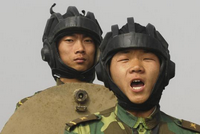Although Taiwanese President Ma Ying-jeou's historic rapprochement with China has ushered in a period of stability in cross-strait relations, the military imbalance between the two neighbors continues to grow. Beijing's military modernization is rapidly dwarfing Taipei's capabilities and blunting Washington's ability to defend its ally in the event of conflict. Left unchecked, this growing imbalance will make it increasingly difficult for Taipei to maintain the necessary deterrent required to preserve its independence from the mainland, and for long-term stability to prevail in the Taiwan Strait.
The calm that has pervaded the Taiwan Strait since Ma's inauguration last year is certainly a marked improvement from the saber-rattling of the past. China and Taiwan have boosted commercial relations and are on track to negotiate a far-reaching economic cooperation agreement. For all their differences, Beijing and Washington, too, seem to have recognized that mutual collaboration is needed on big-ticket issues like climate change and the global economic crisis.
However, neither the United States nor Taiwan should harbor any illusions about the promise of cross-strait reconciliation. Despite the political honeymoon of the past year, any permanent resolution of Taiwan's status is still a long way off. Beijing still insists that Taipei is part of its territory, still maintains that eventual reunification is its goal, and still refuses to renounce the use of force in the resolution of any conflict.

